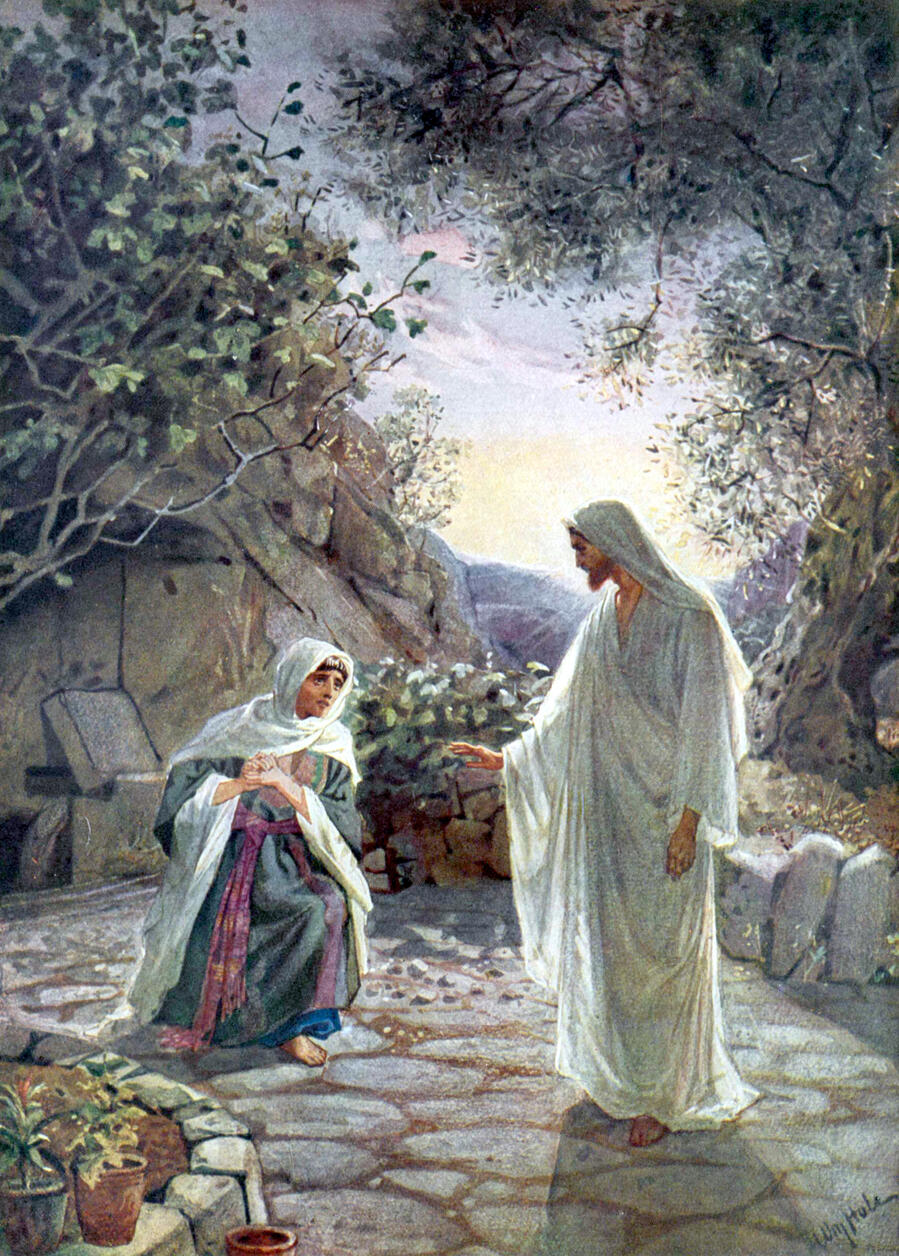
Contact: [email protected]
Click above for story text
Click above for story audio
Click above for story text
Click above for story audio
Click above for story text
Click above for story audio
Click above for story text
Click above for story audio
Click above for story text
Click above for story audio
Click above for story text
Click above for story audio
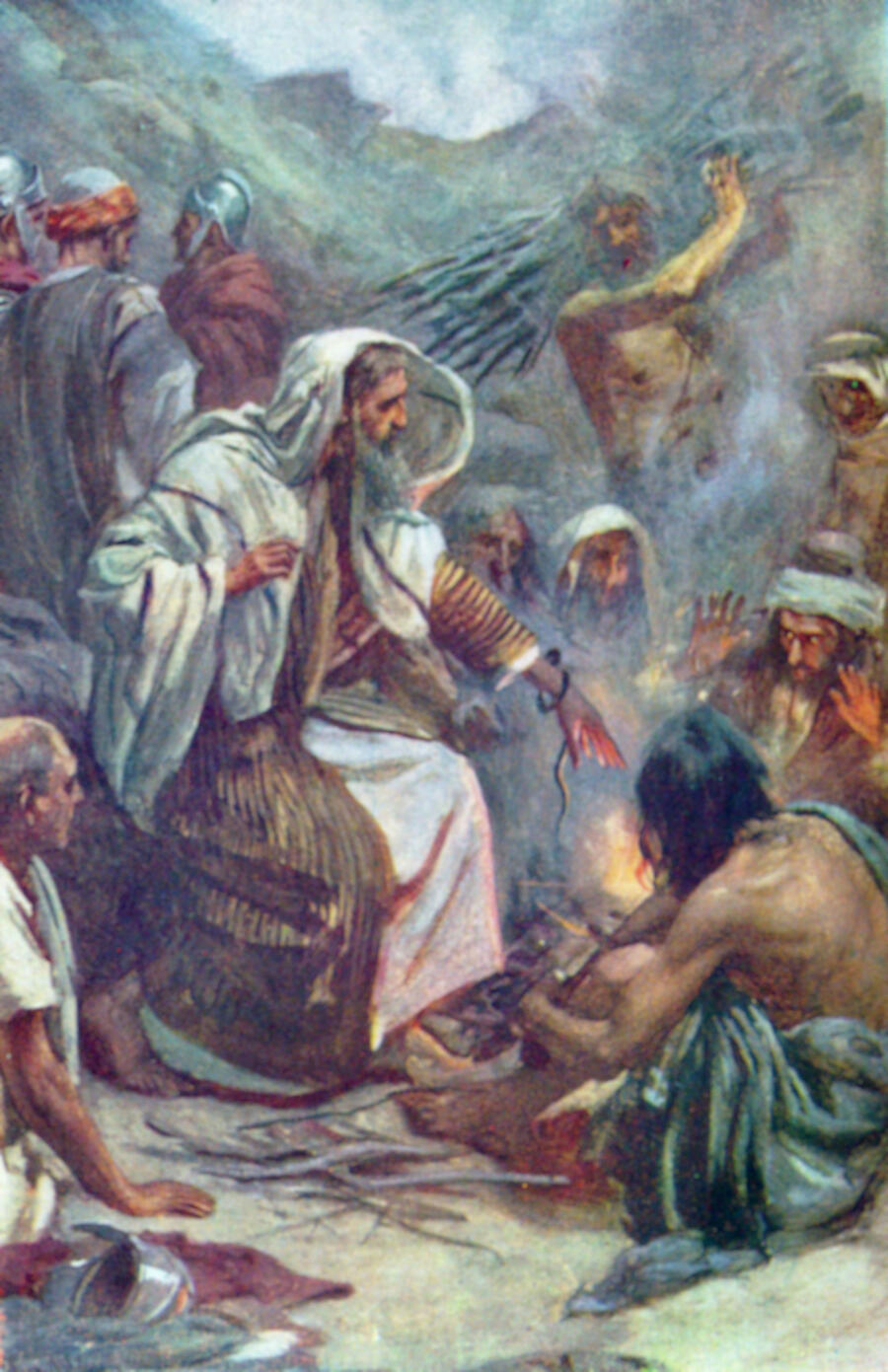
Paul’s Journey to Rome
From the New Testament Book of Acts
Before he went to Rome Paul spent two years in prison in Caesarea. When he was brought before the governor Festus, he said to him, “If there is no truth in what these men say against me, no one has the right to give me up to them. I appeal to Caesar!”
Then Festus, after consulting with his council, answered:
“Have you appealed to Caesar? To Caesar shall you go!”
So, soon afterwards, Paul, together with some other prisoners, was put in charge of a Roman captain named Julius. Happily he was not alone, for Aristarchus, a brave Christian who was dragged into the theatre at Ephesus, was with him, as was also his faithful friend Luke, who had already gone with Paul on some of his travels and who would later write a Gospel and the Book of Acts.
The truth was that it was even now getting too late in the year for starting a long voyage, for in those days it was dangerous to be out at sea much after the beginning of September. As it was now August, it could only be by means of the most favorable winds that Julius could hope to reach Rome before the winter set in.
Indeed, soon their troubles began, for the west wind blew dead against them, and it was only after enduring very heavy seas that they managed to get safely to the port of Myra.
Julius ordered the soldiers and prisoners to change into a ship which was carrying a cargo of wheat from Egypt to Italy.
Having left Myra, the wind fought hard against the ship for many days, driving it south to the island of Crete, and here the voyagers managed to get to the little harbour called Fair Havens.
Many days had now been wasted, and every day’s delay made the voyage more dangerous. So Paul spoke up.
“Sirs,” he said gravely, “ I perceive that this voyage will be with hurt and much damage, not only to the lading and ship, but also to our lives.”
But Fair Havens, in spite of its pleasant name, was such a miserable place in which to stay that Julius agreed with the pilot and the owner of the ship, rather than with Paul, that it was better to go forward.
At first it seemed as though he was right, for a soft south wind sprang up, blowing in the very direction they wanted; so, greatly encouraged, they let the ship loose. All went well for a few hours; but suddenly there swept down upon them, from the highlands of Crete, a terrible north-easterly gale. It caught the ship before they were even aware of their danger. The ship was blown helplessly south-westwards, over the raging waters.
The pilot gave orders that every bit of useless tackle was to be thrown into the sea to lighten her.
Thus day after day went by. They saw neither the sun by day nor the stars by night, and the crew and all the passengers gave up all hope of being saved.
Then it was that Paul came forward, and raised his calm voice above the roar of the tempest and said:
“Sirs, you should have listened to me. And now take courage, for there will be no destruction of life among you, but of the ship only. For there stood by me this night the angel of God, whom I serve, saying: Fear not, Paul; you shall be brought before Caesar; and lo, God has given you all that sail with you.’
At Paul’s words they took some faint courage, and it was on the fourteenth night that, about midnight, the sailors began to suspect that the ship was nearing land.
Indeed, the ship ran aground, and the front part stuck fast, and the hind part was broken to pieces by the violence of the sea.
So the poor ship was cut into two parts, and the soldiers cried out to their captain that they had better kill the prisoners, in case any of them escaped.
But Julius was anxious to save Paul, so he commanded that all who could might swim to the shore.
So it came about that some swam, and the rest, some on boards and some on broken pieces of the ship, all escaped safe to land.
They discovered that they were on the island of Malta, and the people, speaking a strange language which they did not understand, came hurrying down to help them.
Everyone was of course drenched with the icy sea-water, and, to make matters worse, it was pouring with rain. So they at once set to work to light a great fire, and Paul helped with the rest to collect the sticks.
As he laid a bundle on the fire, a poisonous viper crept out from the wood, and curled round his hand.
A bite from a viper meant certain death, and when the islanders saw it, they said amongst themselves:
“No doubt this man is a murderer, though he has escaped the sea, yet now vengeance is come!”
But Paul shook the viper off into the fire and felt no harm.
The others stared at him, but when nothing happened, they changed their minds, and felt sure that Paul was a god.
The governor of the island heard of the distress of the shipwrecked people and was most kind and courteous; and Paul had the pleasure of laying his hands on the governor’s father and healing him from a fever.
This act excited the islanders more than ever, and they brought their sick friends to Paul to be healed; and Paul, through the power of the Spirit of Jesus Christ, was able to heal everyone.
So now they stayed through the worst of the winter; and afterwards, finding another ship in the harbour, they proceeded on their journey, and at last Paul was brought safely to Rome.
In the end Paul was condemned to death, and died by the sword, a glorious martyr. He had fought the good fight. He had finished his race, and there was laid up for him a crown of righteousness in the glory where God is.
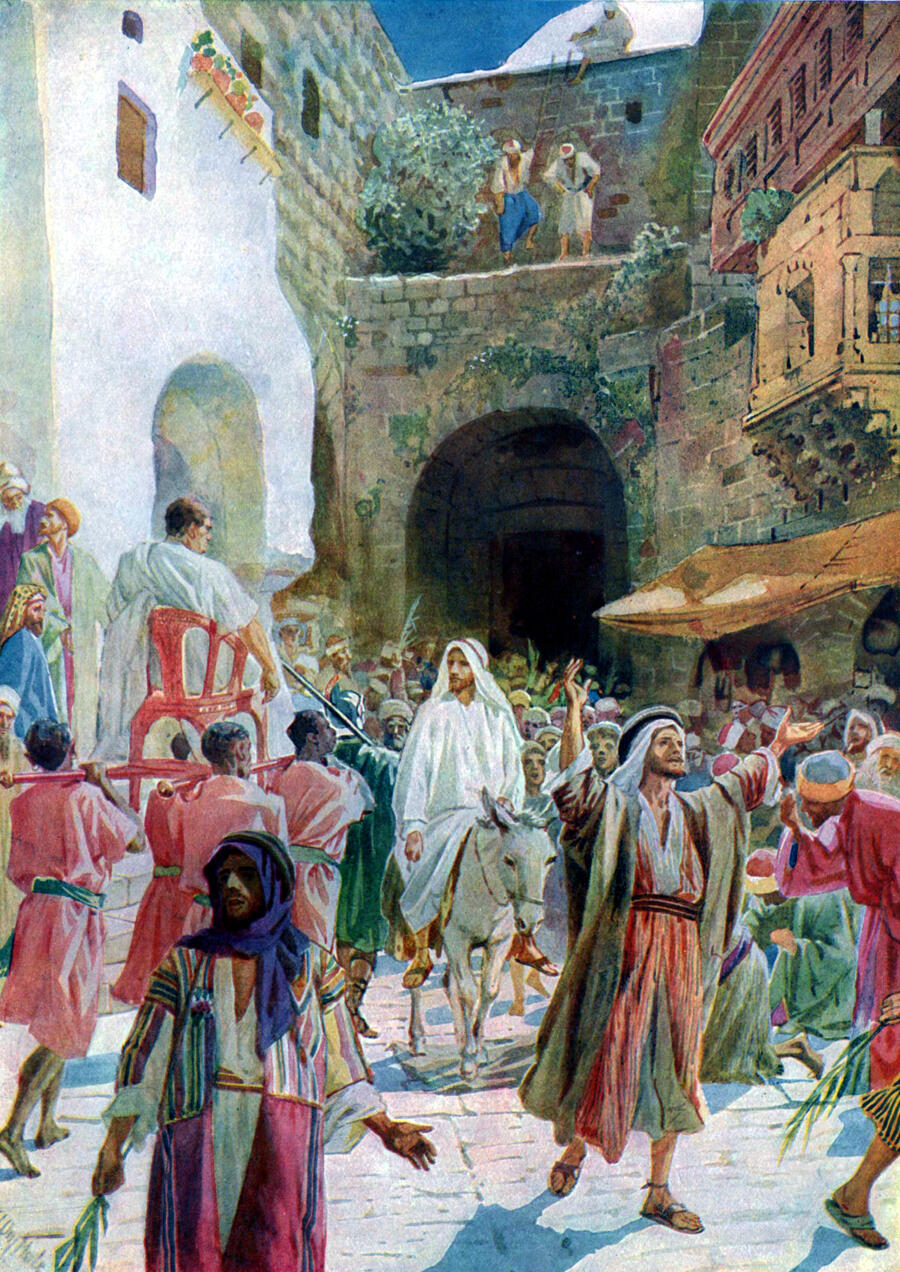
The Story of when Jesus rides into Jerusalem
From the Gospels
You may remember that when Jesus was twelve years old He came up to Jerusalem to join in the great Passover Feast. He was now thirty-three years old, and the Passover had come round again. This time it would be impossible for Him to be lost in the crowd, for everyone was talking about Him and wondering how He would come to the Feast. Would He proclaim openly that He was the Son of God amid those who were anxiously plotting to kill Him?
Jesus did not fear what any man might do to Him, for He knew He was doing perfectly His Father’s will. Therefore, early in the morning of the day we call Palm Sunday, Jesus and His disciples came over from behind the Mount of Olives on their way to Jerusalem. Then Jesus said to some of His disciples:
“Go into the village opposite you, in the which you will find a colt tied up, which no one has sat upon; loose him and bring him here. And if any man ask you: ‘Why are you taking him?’ you shall say: ‘Because the Lord has need of him’.”
So the disciples hurried away, and found the colt there, exactly as Jesus had said; and the moment the colt’s master knew that it was Jesus who wanted his animal, he gladly let him go. Then the disciples brought the colt to Jesus, and using some of their clothes as a saddle, they sat Him upon the beast.
But by this time crowds were gathering, and as they saw that Jesus was really going to Jerusalem, the people set up a wild shout of joy; for at last, they thought, their beloved Teacher and Prophet was going to make Himself a King, and free them from the Romans and from all their other enemies.
In their enthusiasm they flung down their clothes for the colt to tread upon, and climbed up into the trees, and cut down branches and strewed them in the path, as though Jesus were indeed a crowned king. And as they rushed along in front and behind, and on each side of Him, they shouted out: “Hosanna to the Son of David! Blessed is He that comes in the name of the Lord! Peace in Heaven, and Glory in the highest!”
Jerusalem was built on a hill, and there was a deep valley between it and the Mount of Olives; and as the people in the city heard the tumult, they came pouring forth to meet Jesus, and all were wildly excited as they asked each other: “Who is this?”
And the jubilant answer was returned:
“This is Jesus, the prophet of Nazareth of Galilee.”
The Pharisees, however, were filled with wrath, and cried to Jesus:
“Master, rebuke your disciples!”
But Jesus answered:
“I tell you that if these should hold their peace, the very stones would immediately cry out.”
But as Jesus paused on the summit of the Mount of Olives, and saw the glorious white and gold roofs of the Temple shining in the morning sun, and all the great mass of people coming out to meet Him, a great passion of sorrow swept over Him, and in the midst of all the joy He began to weep bitterly.
For, alas! He knew that Jerusalem was going to reject Him and put Him to death, and that, in the days to come, the Romans would burn that glorious Temple and break down the city and its walls, until it was all desolate and ruined.
But the children watched in wonder as they saw the Prophet weep, and were glad when the procession started once more, and they could shout and cheer Him.
So Jesus went down into the deep valley, and up a steep way into Jerusalem, and as the crowd pushed and struggled through the narrow streets, people looked in amazement from their windows, and all the city was in a tumult.
Jesus went straight to the Temple, His Father’s House, not fearing the Chief Priests; and the children followed, still cheering and crying out:
“Hosanna in the Highest! Blessed is He that comes in the name of the Lord!”
When Jesus came into the temple, and saw the money changers and the merchants, he was angry. He began to drive out those who bought and sold and said to them, “It is written, ‘My house is a house of prayer,’ but you have made it a ‘den of robbers’!”
And so, day by day that first part of the week, Jesus boldly taught the people in the Temple, telling them the great secret that He was sent from Heaven, not to be the King of their country, but the King of their hearts. Meanwhile, the chief priests, the scribes and leading men sought to destroy him, but they didn’t know what to do, for all the people were hanging on every one of Jesus’ words.
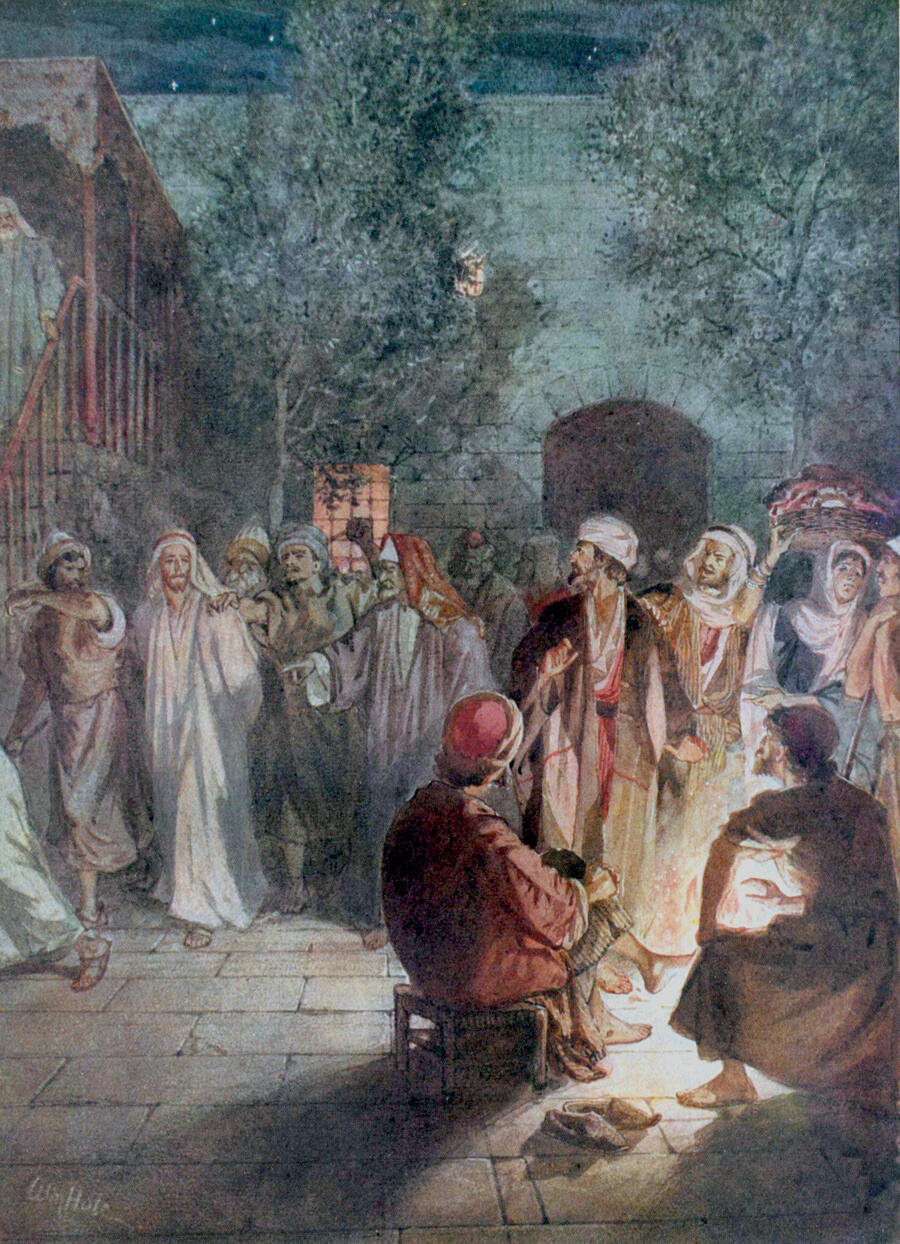
Jesus In the Garden
From the Gospels
As the days of Holy Week passed, the Chief Priests grew more and more anxious to take Jesus prisoner, that they might get the Roman Governor to condemn Him to death; but they dared not take Him openly, because they dreaded that the people might rush to His rescue.
Great was their joy, therefore, to receive a secret visit on Thursday night from one of Jesus’ own disciples.
This man’s name was Judas. He was one of the twelve, and had followed the Master for three years, and had seen all His wonderful miracles and kind deeds, and had listened to His gracious, loving words.
But, alas! Judas loved money and power, and he was terribly disappointed that Jesus was not going to make Himself into a great earthly king. So the evil idea came to him that he would make friends with the Chief Priests by helping them to catch Jesus, when none of the people were about.
Judas told the Chief Priests that if they would come with him, he would show them the place where Jesus was, and betray him to them. The priests were delighted to accept this chance, so they gave Judas thirty pieces of silver, as the price for betraying Jesus.
At the very time when Judas was talking to the Chief Priests, Jesus and the eleven other disciples were sitting in an upper room in Jerusalem, partaking of the last supper together.
While they were eating Jesus took bread, blessed it and broke it and gave it to his disciples, saying, “Take, eat. This is my body.” Then he blessed the cup of wine and they drank it. He said, “This is my blood of the new covenant, which will be poured out for many.”
Then Jesus told them that all of them would be made to stumble that night on his account.
Peter cried out:
“Lord, I am ready to go with you into prison and to death!”
But Jesus answered:
“I tell you, Peter, before the cock crows, you will deny me three times!”
Then Jesus rose, and they all went out together to the garden of Gethsemane.
Jesus went a little distance from His disciples, that He might pray to His Father; for He knew that He was about to suffer a terrible death, and that the people He loved and longed to serve were going to choose evil instead of good, and were going to turn against Him and shout out: “Crucify Him! Crucify Him!”
So He kneeled in his agony, and he was greatly distressed. But at last He cried out to His Father:
“Not My will, but Thine, be done!”
The disciples had all gone to sleep, for they were very tired; but suddenly they were awakened by the trampling of feet, and shining lights. The Chief Priests and soldiers were entering the garden, and in front of them all was Judas. He came straight up to Jesus and kissed Him, as a sign to the soldiers.
Then Jesus said to Judas:
“Do you betray the Son of Man with a kiss?”
But the disciples had leapt to their feet, and one swiftly cut off the ear of the High Priest’s servant.
But Jesus would not let His disciples fight; “For,” said He, “cannot I now pray to My Father, and He would instantly send Me more than twelve legions of angels?”
And reaching out His hand, he healed the servant’s ear.
Jesus spoke to those who had come to arrest him:
“Do you come out as against a thief, with swords and clubs? When I was daily with you in the Temple, you did not arrest me; but this is your hour, and the power of darkness.”
Then Jesus allowed Himself to be led away to the High Priest’s house.
Peter followed, anxious to know what would happen to his Master, and sat down among the servants by the fire which was there, hoping that no one would notice that he was one of the disciples. But a woman came up and said:
“This man was also with Him.”
Peter was startled and frightened, and muttered:
“I know Him not.”
But after a while a man came in and said:
“You are also of them!”
But Peter answered:
“Man, I am not!”
All this time Jesus was standing at the high end of the hall, with His hands bound, being insulted and questioned by the priests.
A whole dreadful hour passed in this way, and then another man came up to the fire and looked earnestly at Peter.
“Of a truth,” he said, “this fellow was also with Him, for he is a Galilean.”
Then Peter, with oaths and curses, answered:
“Man, I know not what you are saying!”
And immediately a cock crew.
Then the Lord turned and looked upon Peter, and Peter remembered how Jesus had said to him during supper:
“Before the cock crow, you shall deny Me three times.”
And as Peter’s eyes met those of his weary, tormented Master, his heart broke in sorrow, and he rushed from the hall and wept bitterly.
Text
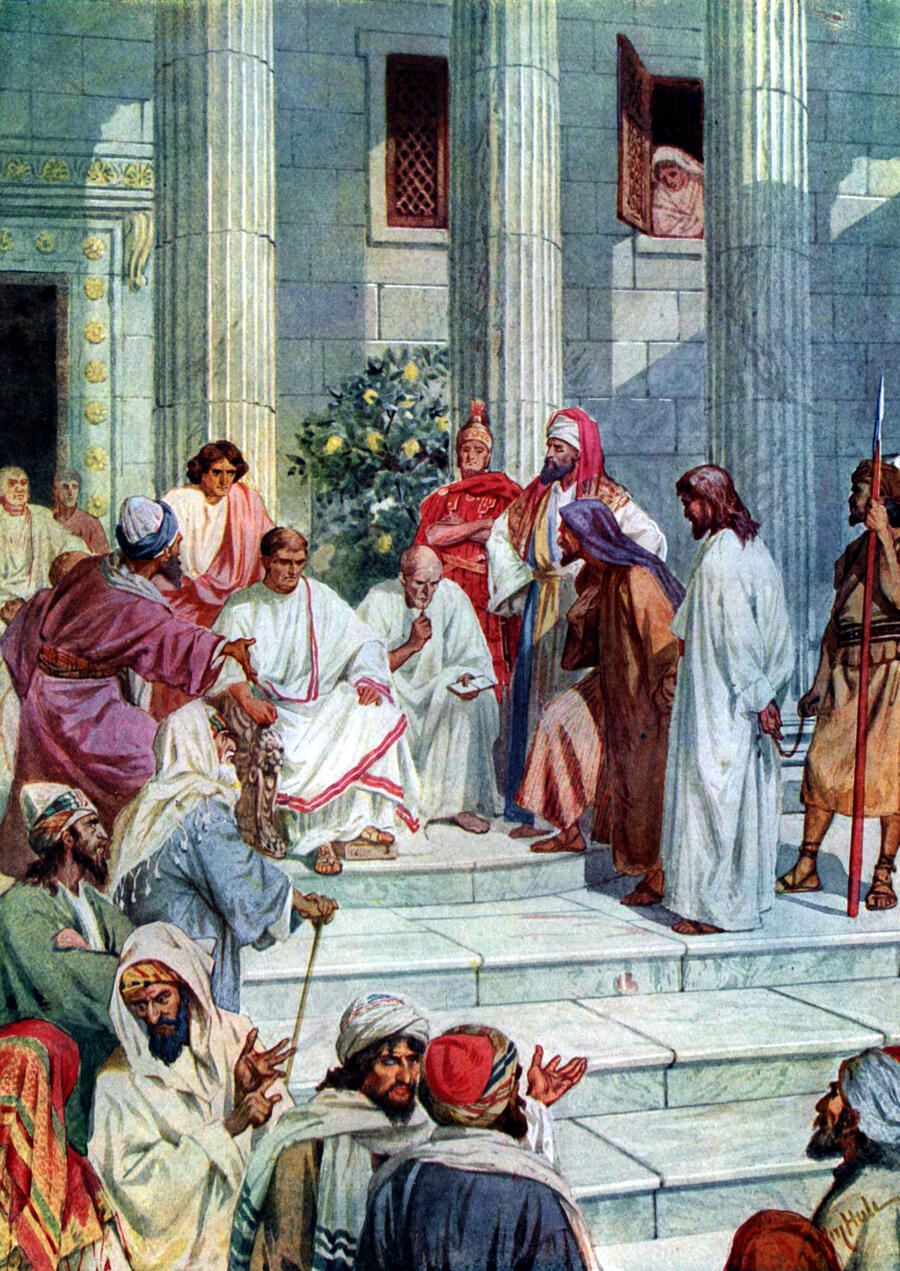
The People Choose
From the Gospels
The Chief Priests and the soldiers kept Jesus awake all that night, passing Him from one judge to another; but as they could not of themselves condemn anyone to death, so on the following morning, which was Good Friday, they brought Jesus to Pilate, the Roman Governor.
Pilate was sent by the Emperor, or Caesar, of Rome to rule Jerusalem and keep everything in order, and if there was trouble and tumult in the city, he knew he would get into disgrace with Caesar, and be severely punished.
But as Pilate looked at his pale young prisoner, and noticed His pure, majestic aspect, he could not think that He had done anything worthy of death. All that he could understand was that Jesus had angered the Jews by saying that He was their king.
At last Pilate said to Jesus:
“Are you the King of the Jews?”
Then Jesus answered the puzzled governor:
“My kingdom is not of this world; if My kingdom were of this world, then would My servants fight, that I should not be delivered to the Jews.”
Then Pilate asked again:
“Are you a king then?”
Jesus answered plainly: “As you say, I am a King. For this was I born, and for this cause came I into the world, to bear witness to the truth.”
Pilate answered, “What is truth?”
Then Pilate brought Jesus forth and cried to the Jews: “I find no fault in Him.”
And as he always let some noted prisoner free in honor of the Feast, he offered to choose Jesus, the King of the Jews, to be the one.
But this made the Jews more furious than ever, and they shouted:
“Not this man, but Barabbas.”
Barabbas was a murderer, who was lying in jail, under heavy sentence.
Then Pilate, hoping to satisfy the angry mob, commanded that Jesus should be terribly scourged, and the soldiers plaited a crown of thorns and put it on His head, and put on Him a purple robe, and cried:
“Hail! King of the Jews!”
Pilate thought that surely now, when they saw the prisoner in such pain and suffering, the people’s rage would be pacified; but, alas! no. They cried out:
“We have a law, and by our law He ought to die, because He made Himself the Son of God.”
Pilate was greatly afraid when he heard that, especially as a message came from his wife imploring her husband not to have anything to do with the death of this just man, because she had had a wonderful dream about Him that very night. So again Pilate took Jesus aside and asked Him who He really was. But Jesus would not speak, until Pilate said:
“Don’t you know that I have power to crucify you, and have power to release you?”
Then Jesus, the prisoner, looked at Pilate, the Governor, and said quietly:
“You have no power at all over Me, except what is given you from above.”
There was such true greatness in the look of this prisoner that again, and for the last time, Pilate tried hard to save Him.
But the people cried impatiently:
“Away with Him! Crucify Him! Crucify Him! Crucify Him!”
Pilate cried:
“Shall I crucify your King?”
They replied:
“We have no King but Caesar.”
Then at last Pilate, in dread lest he should get into trouble with Caesar if he let anyone who called himself a king go free, commanded that Jesus should be crucified. He had a sign written, to be placed on Jesus’s cross, which said, “This is Jesus of Nazareth, the King of the Jews.”
So Jesus was led forth out of the city, carrying a heavy cross on His shoulders, and was crucified, while two thieves were crucified with Him, one on the right hand and the other on the left.
But Judas, when he saw that his Master was really going to be killed, was filled with horror, and rushing to the Chief Priests, he flung the thirty pieces of silver on the pavement at their feet. But the Chief Priests only mocked at Judas, and he, unable to bear the thought of what he had done, fled away and hanged himself.
But John the disciple went and found Mary the mother of Jesus, and together they went with some other women to watch and pray at the foot of Jesus’ cross.
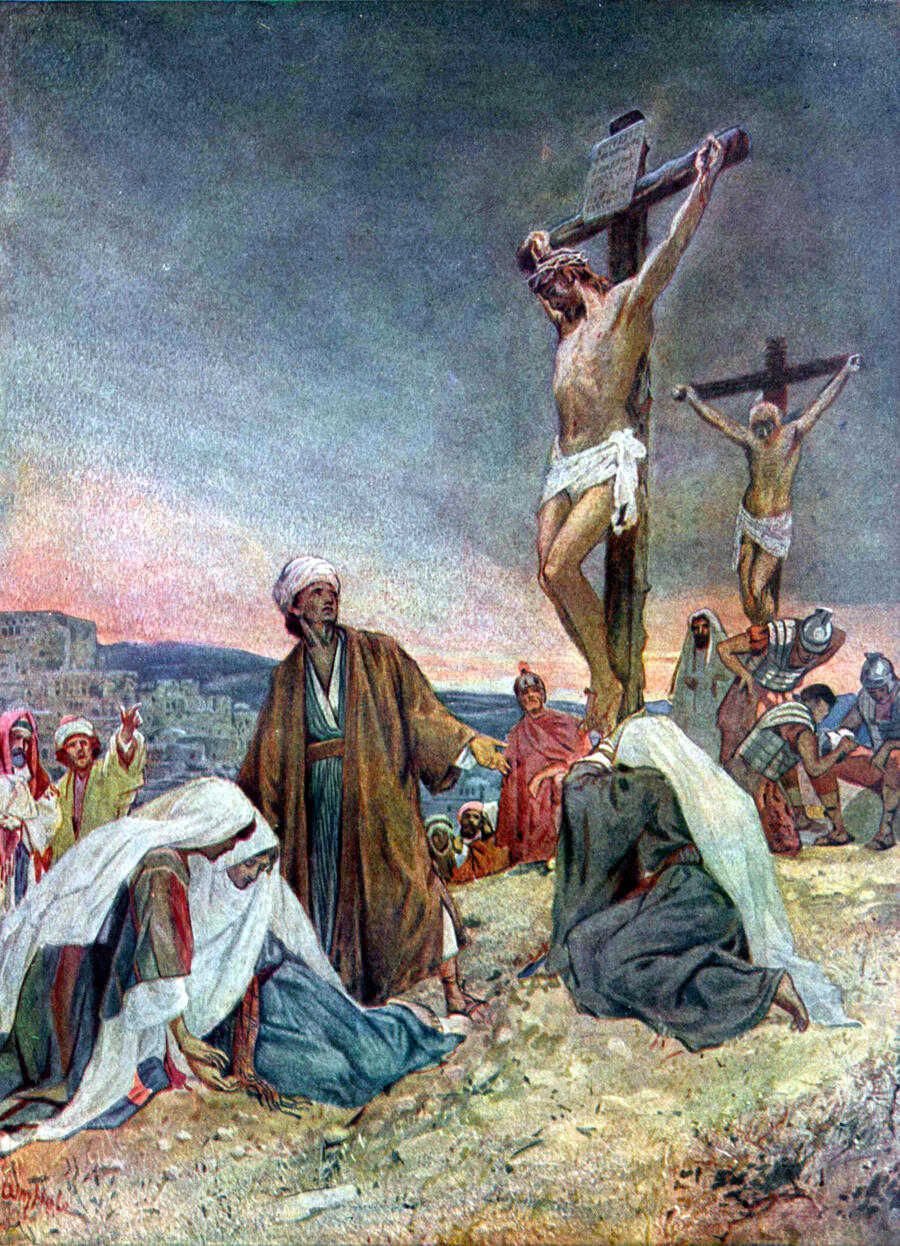
The Cross
From the Gospels
Jesus hung on the Cross for three hours, and some of His poor heart-broken disciples, and great crowds of people, came and watched Him in His pain. Some faithful women who loved Jesus came also, and amongst them was Mary, His own mother.
How Mary must have thought of the little babe that came to her in Bethlehem; of the shepherds and the chorus of angels; of how she and Joseph had fled into Egypt from the wicked king Herod; of all the years that Jesus had lived quietly at Nazareth; and of these last three years in which He had gone about doing good, healing the sick and telling the people of His Father in Heaven!
Yet it had all ended in her beloved Son being hanged on a cross between two thieves.
The two thieves who were there with him both at first mocked him, but then one of them repented and said to him, “Lord remember me when you come into you kingdom.”
Jesus told him, “this day you will be with me in Paradise.”
At one point Jesus cried out, “My God my God why have you forsaken me!” This is the beginning of a psalm that starts in great bitterness and pain, but ends with joy.
Joseph the good carpenter had died some time before; and as Jesus looked down and saw His mother standing there and weeping, He called to John, His favourite disciple, and said “Behold your mother.” And he said to his mother, “Behold your son.” John took care of Mary for the rest of her life, and so she also became the mother of all the disciples of the Lord.
Now about three o’clock in the afternoon a great dark¬ness came over all the land, and the earth shook: and great fear came on all the people of Jerusalem, while through the darkness those who were standing near the Cross heard Jesus cry:
“It is finished. Father, into Thy hands I commend my spirit.”
And bowing his head, he gave up his spirit.
When the captain over the soldiers heard that cry, he exclaimed:
“Certainly this was a son of God!”
As for the crowds who had come to watch, many of them beat on their breasts, and returned to Jerusalem terrified and miserable, knowing that an awful sin had been committed.
But there was a rich man, named Joseph of Arimathea, who went at once to Pilate, and begged that he might have the body of Jesus. So Pilate gave him leave, and he came and very carefully and tenderly took the precious body down from the Cross, and wrapped it in beautiful new linen, and laid it in a new tomb, which was cut from a rock, and in which no one had ever been laid before.
Some of the women followed and saw where Jesus had been laid, and they hurried back home to make sweet ointment and spices, so that when their Sabbath day (which was Saturday) was over, they might take them to the grave.
But once again that day the Jews wearied Pilate by demanding to see him. They told him that Jesus had said, when He was alive, that He would rise again from the dead; so they asked leave to set a watch, and put seals over the stone at the mouth of the tomb, in case the disciples should come in the night and steal His body, and say that He had risen.
Pilate was vexed and irritated, and though he gave them leave, he answered them scornfully, saying:
“Make it as secure as you can."
